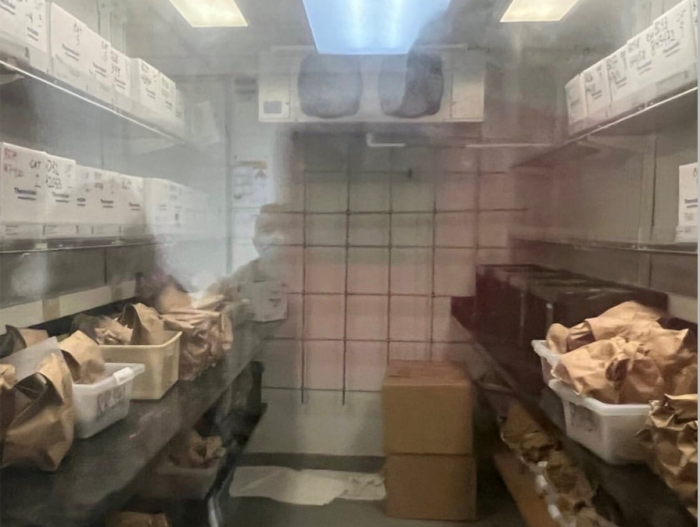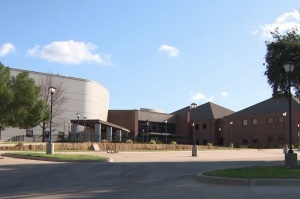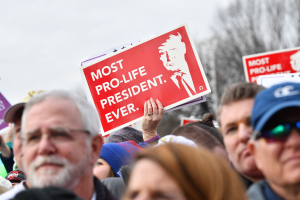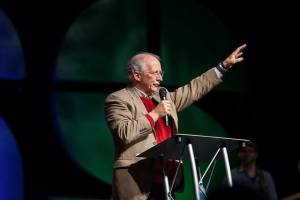Pro-life groups demand answers after exposing freezer full of aborted babies body parts at university

UPDATED APRIL 1 at 10:00 AM ET:
A group of pro-life activists have discovered human fetal remains in a freezer at the University of Washington, leading to calls for institutions involved in such research on babies to face accountability.
On March 9, leaders of pro-life groups, including the Progressive Anti-Abortion Uprising, Survivors of the Abortion Holocaust, Pro-Life San Francisco and Rehumanize International obtained access to what the organizations described as “the largest and most active fetal organ bank in the nation located at the University of Washington in Seattle” in a statement. The groups obtained a photograph of a walk-in freezer at the university's Birth Defects Research Laboratory that contains aborted babies' body parts.
“The American people must be made aware of the mass dehumanization of these unborn children who are violently killed and thrown into a freezer, whose body parts are then portioned out to researchers in pursuit of federal funding,” said Terrisa Bukovinac, founder and executive director of Progressive Anti-Abortion Uprising. “It is my hope that this photograph reminds us all that there are real victims being lethally oppressed by UW and traded like property. Fetal trafficking is abhorrent and it must end.”
???????????? ???????????????????????????????????? ????????????????????????????:
— PAAU (@PAAUNOW) March 24, 2022
Pro-Life Groups Discover Freezer of Human Fetuses at the University of Washington
On March 9th at 6:30pm, Anti-Abortion activists from groups including PAAU, @TheSurvivors , @prolifesf, & @RehumanizeIntl gained access to the largest & pic.twitter.com/CQM4Sakuri
“They know that they are engaged in practices that are likely leading to a failure to uphold the Born Alive Infant Protection Act and that they are not in compliance with federal law as it relates to their records,” said Bukovinac in an interview with The Christian Post. The activist added that she was one of four pro-life leaders to address the Board of Regents at UW, where they demanded transparency and that the university “comply with federal law.”
“We would like to see full transparency from the university to find out exactly what they’re engaged in, force them to comply with the law and then ultimately to be held accountable for their crimes.
“The Regents, during these public comment sessions, do not comment or react to the statements being made," she added.
While the members of the UW Board of Regents did not react verbally as the pro-life activists confronted them during a public comment session, Bukovinac said “they did seem surprised and several of them seemed interested, concerned, just based on their demeanor and the looks on their faces.”
“We’ve had our eye on Seattle for a while, knowing that it is an abortion stronghold," Bukovinac continued. "We know that [UW] have failed to give records as they relate to their fetal tissue research program. We know that the university is the largest fetal tissue bank in the country.”
While UW declined to comment on the allegations that they were violating the Born Alive Infant Protection Act and not in compliance with federal law relating to records requests in ongoing litigation, the university provided this statement to The Christian Post:
The photograph is of a locked cold room at the University of Washington School of Medicine. The cold room contains specimens of fetuses with birth defects and other anomalies donated to UW School of Medicine scientists starting in the 1960s to help advance research into and education about devasting birth defects.
Previously preserved in formaldehyde, several years ago the specimens were removed from the original, degrading containers. They were evaluated for continued scientific and educational importance, then placed in new containers that are stored inside bags in the cold room. During this process we determined that these specimens were no longer of scientific or educational importance and are to be respectfully cremated.
We must take certain regulatory steps before cremation and have for some time been in the process of taking those steps so that the respectful cremation can occur.
This process is common when an institution considers the continuing educational or scientific value of its historical collections.
The UW is a leader in research into birth defects and other devastating conditions that can affect the health of fetuses, all with the goal of improving the health and well-being of babies and their mothers. We commend the families that even in their grief over losing a baby sought to further advance the health of others by donating to UW scientists studying birth defects.
Bukovinac is not the only pro-life activist seeking more information about UW’s fetal tissue research.
Documents made available as a result of public records requests from the group Indiana Right to Life gave Bukovinac and the other pro-life leaders all the information they needed to find the freezer full of fetal tissue, organs and other body parts.
One document, a 2013 invoice for fetal brains addressed to the University of Indiana, listed the location of the UW Birth Defects Research Laboratory as 1959 NE Pacific Street, Health Sciences Bldg., Room RR 346, Seattle, WA 98195-6320.
Bukovinac said she and other pro-life activists were able to easily access the freezer and did not encounter security in the building: “It didn’t take too long to locate the freezer. We saw it. At first, we were trying to look inside and shine a light because there was a small window to look through, but we soon realized that there was a light switch on the outside and when we flipped it on, we could see everything that you see in the photograph.”
Similarly, David Daleiden of the Center for Medical Progress, a pro-life group that gained notoriety for releasing undercover videos of Planned Parenthood officials discussing their profiting off the sale of aborted baby body parts, sued UW as he sought to release information about its purchase of fetal body parts. In November 2016, a federal judge issued an order preventing Daleiden from naming UW officials involved in fetal tissue research. A panel on the Ninth Circuit Court of Appeals reversed that decision.
In addition to pro-life activists, UW’s research involving aborted baby parts has also caught the attention of Congress. A 2016 report compiled by a select investigative panel on the U.S. House of Representatives Energy & Commerce Committee revealed that the university had received fetal tissue from “over a dozen clinics” in the preceding five years and charged recipients of the tissue “a flat fee of $200 regardless of the nature of the tissue researched.”
“The Panel’s independent research found that UW deploys doctors to outside abortion clinics and that numerous physicians on the staffs of those clinics hold faculty positions at UW,” the report noted. Additionally, the UW Birth Defects Research Laboratory received $600,000 in taxpayer funding from the National Institutes of Health in 2015.
The University of Washington is not the only public university that has dabbled in fetal tissue research and established relationships with abortion clinics. The 2016 report detailed relationships between other public universities and nearby abortion clinics, including the University of New Mexico, the University of Minnesota, Colorado State University, the University of California at San Francisco, Washington University, University of Wisconsin and the University of Michigan.
Last month, The White Coat Waste Project, which describes itself as a “taxpayer watchdog group representing more than 2 million liberty-lovers and animal-lovers who all agree: taxpayer dollars shouldn’t be forced to pay over $20 billion every year for wasteful and cruel experiments on dogs, cats, monkeys, and other animals,” released a report outlining the use of taxpayer dollars to fund research using aborted babies’ body parts. The investigation determined that the National Institute of Health was spending $27 million on fetal tissue research.
The White Coat Waste Project report identified the National Institutes of Allergy and Infectious Diseases as the NIH agency that has received the largest share of the taxpayer dollars allocated to fetal tissue research. The funding was then dispersed to public universities, including the University of North Carolina at Chapel Hill and the University of Nebraska-Lincoln, which used the money to create “humanized mice” from aborted fetal tissue.
Last year, the pro-life group Students for Life of America, held a rally outside the NIH headquarters in Bethesda, Maryland, to demand the firing of NIAID head Dr. Anthony Fauci over his agency’s role in bankrolling similar research at the University of Pittsburgh. In undercover video footage published by the Center for Medical Progress, Planned Parenthood officials discussed how they supply the university with the fetal tissue that they use to conduct their research.
While Bukovinac “selected those dates to go to Seattle because we knew the regents were meeting,” confronting the UW Board of Regents constituted just one part of her trip. “We decided that we wanted to come to Seattle to host a training event there, which we did,” she said.
“There was also a Rise Up for Abortion Rights protest there on that Tuesday, and so we wanted to counter that, which we did. It was definitely one of the most violent pro-abortion events we’ve done. Everyone in our group was assaulted during that protest.”
In the days following their trip to Seattle, Bukovinac and the other pro-life activists traveled to Zuckerberg General Hospital in San Francisco, which also engages in fetal tissue research: “We called out to the staff explaining exactly why we were there, our demand that it stop immediately their unethical fetal organ harvesting practices. Then a hospital administrator, along with the San Francisco Sheriff’s Office then arrested us, held us for about an hour, probably 45 minutes and then cited and released us.”
Bukovinac, who describes herself as a liberal atheist, said although “we expected people to descend upon our social media calling us liars,” the March 23 social media post showing a picture of the UW freezer resulted in “absolute silence,” adding, “We’re being completely ignored by the Left. They’re ignoring this entirely. It doesn’t seem to be something that they actually want to confront or acknowledge at all.”
Ryan Foley is a reporter for The Christian Post. He can be reached at: ryan.foley@christianpost.com




























